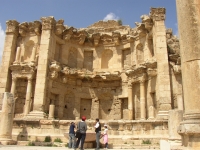
8. Social Meaning
Who did gain for the Roman aqueducts?Here a set of questions with relevant answers, some of which are linked to related subjects as discussed in other places within this website www.romanaqueducts.info
Additional questions or remarks are most welcome via w.d.schram 'at' romanaqueducts.info
Questions
- Who gained from it?
- Did the aqueducts improve life of the Romans?
- How did Roman aqueducts affect society?
- Had the aqueducts any impact on the Roman empire?
- How did the Roman aqueducts changed the life of ordinary people?
- How did aqueducts help the Romans?
- What did the aqueducts mean to the Roman civilisation?
- Do some aqueducts had fountains?
- Why were aqueducts important to Roman towns?
Answer
The major purpose of an aqueduct was to deliver water to the people in the towns. In the days before the aqueducts water was furnished by a local stream and/or wells. Sometimes rain water was collected in underground reservoirs (the so called cisterns). But streams and rivers got polluted, wells dried up because of too frequent use, and rain-water was not enough to lessen the thirst of everyone. So, if you wanted to be elected in the town council, you made a financial contribution to the construction of an aqueduct. It underlined the private wealth of the citizens and in this manner also contributed to the status of the city involved.The introduction of an aqueduct also made it possible to build Roman baths complexes and other water consuming amenities like ornamental fountains. Aqueducts became an expression of power and wealth of a city.
And in the mean time, ordinary people benefited: less polluted water not that far awary from the living quarters.
There were also disadvantages: cities got dependant of this type of water supply. In time of war the besieger of a town could pollute the aqueduct water or cut the supply. There are even examples where aqueduct channels were used to infiltrate a town!